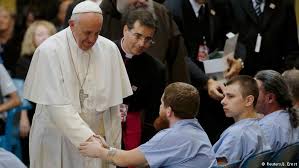
Back to Business as Usual?
The Pope is back in Rome, and everything’s back to normal. Whew!
Republicans and Democrats, liberals and conservatives can go back to attacking each other, ignoring the poor, the unborn, the environment and the common good. We can all go back to separating our “religious” or “spiritual” lives from our “real” ones, basing our decisions on finances, the dominant views of our age group, our politics, our personal likes and dislikes, the desperate need to “be ourselves.”
Listening to the pope, we almost believed that things could change, that we have a higher calling, that hostility, apathy and indifference aren’t the norm.
Sorry if this sounds cynical. I don’t really want it to be. But after nearly three-quarters of a century of life on this earth, it’s hard to be optimistic.
Still, I agree with the media that the pope exuded optimism and hope. Let’s review a few of those hopeful messages from this pope, whom I believe to be a prophet for our time. Maybe we can internalize what he had to say. Maybe there is hope for our nation and world.
For me, one of his most important messages, seemingly lost on many religious people, was about inclusiveness. In Philadelphia, Pope Francis used a gospel story from the Sunday liturgy to illustrate it, a story in which Jesus’ disciples were grumbling about people not in their group who were doing good.
Scandalized by God’s Freedom?
For many people, the pope said, Jesus’ “openness to the honest and sincere faith of many men and women who were not part of God’s chosen people seemed intolerable. The disciples, for their part, acted in good faith. But the temptation to be scandalized by the freedom of God, who sends rain on the righteous and the unrighteous alike, bypassing bureaucracy, officialdom and inner circles, threatens the authenticity of faith.
“To raise doubts about the working of the Spirit, to give the impression that it cannot take place in those who are not “part of our group”, who are not “like us”, is a dangerous temptation. Not only does it block conversion to the faith; it is a perversion of faith!”
Although he didn’t repeat it word for word, Pope Francis was clear in speeches in this trip about a second important point, following up on past remarks. He refused to be drawn into the culture wars – the hateful battle in society over thorny issues like abortion, same-sex marriage and assisted suicide. He hasn’t tried to hide his stance on those issues, or that of the church but he has said that dialogue is needed and church members shouldn’t be combatants.
“We cannot insist only on issues related to abortion, gay marriage and the use of contraceptive methods,” he has said. “This is not possible. I have not spoken much about these things, and I was reprimanded for that. But when we speak about these issues, we have to talk about them in a context.
“I can clearly see,” the pope has said, “that what the Church needs today is the ability to heal wounds and warm the hearts of faithful. It needs to be by their side. I see the Church as a field hospital after a battle. It’s pointless to ask a seriously injured patient whether his cholesterol or blood sugar levels are high! It’s his wounds that need to be healed. The rest we can talk about later. Now we must think about treating those wounds.”
Rejection of Fundamentalism
The pope also was clear in this trip in his rejection of fundamentalism, whether Christian, Jewish, Muslim, or of the secular kind.
“We know that no religion is immune from forms of individual delusion or ideological extremism,” the pope said in his speech to Congress. “This means that we must be especially attentive to every type of fundamentalism, whether religious or of any other kind. A delicate balance is required to combat violence perpetrated in the name of a religion, an ideology or an economic system, while also safeguarding religious freedom, intellectual freedom and individual freedoms.
“But there is another temptation which we must especially guard against: the simplistic reductionism which sees only good or evil; or, if you will, the righteous and sinners.”
Finally, saying that he himself is the son of immigrants, Francis reminded us of what is demanded by our brotherhood and sisterhood, as well as by most of our religions: that we respect and help people who for whatever reason migrate from one part of the world to another. This is especially important in the U.S., where a new Pew study predicts continued immigration to the U.S.
Whites in the Minority
“Non-Hispanic whites are projected to become less than half of the U.S. population by 2055 and 46% by 2065,” the study says. “No racial or ethnic group will constitute a majority of the U.S. population. Meanwhile, Hispanics will see their population share rise to 24% by 2065 from 18% today, while Asians will see their share rise to 14% by 2065 from 6% today.”
This may bother many people now in the majority, but the pope reminded members of Congress and us that “we must not be taken aback by their numbers, but rather view them as persons, seeing their faces and listening to their stories, trying to respond as best we can to their situation. To respond in a way which is always humane, just and fraternal.”
Yes, the pope is back in Rome, leaving us to our ways. Maybe some of what he said has rubbed off, and there’s real reason for hope. But I hope he doesn’t stay away too long.



